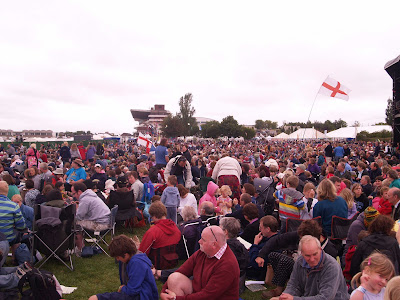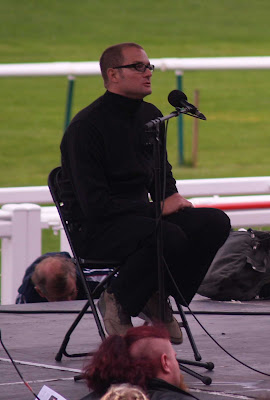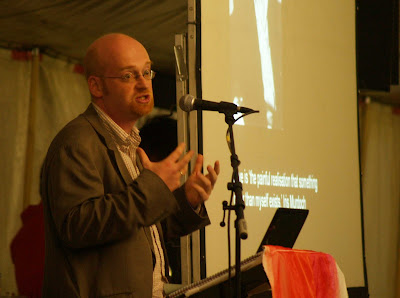
I did my best, it wasn’t much
I couldn’t feel, so I tried to touch
I’ve told the truth, I didn’t come to fool you
And even though it all went wrong
I’ll stand before the Lord of Song
With nothing on my tongue
but Hallelujah
Monthly Archives: September 2009
TBTM20090911

“Get a move on you ‘orrible lot! You’ve got another three miles of sand to run in, now watch your step! Move it, move it, move it!”
Not quite the exact words I heard, but close enough.
Is it wrong to occasionally wish that churches could be led like an army? More could be achieved in some ways, but doubtless that means that the mistakes would be huger alongside the successes, and I suspect a muddling through, soul by soul, is more what the Lord has in mind for us. In his patience is our salvation.
(NB Ollie was most excited to see them, thought it was great fun. I don’t plan to run along with a pack on my back any time soon though.)
TBTE20090909

This is a fascinating article (polemic) about the Anglican shenanigans. (H/T MadPriest)
My Top 10 U2 Songs
(I can do this post now they’ve sorted out the copyright issues!)
I’ve followed U2 for some 25 years now, since watching ‘Live at Red Rocks’ at boarding school, and buying Under a Blood Red Sky. They’ve gone through a few changes of style since then… It would be fair to say that I like just about everything they’ve ever done; that is, if I had to make a list of ‘U2 songs I don’t like’ I probably wouldn’t need more than one hand to list them on.
#10 Who’s gonna ride your wild horses?
#9 October
#8 Bad
#7 All I want is you
#6 A sort of homecoming
#5 I still haven’t found what I’m looking for
#4 Sometimes you can’t make it on your own
#3 Miss Sarajevo
#2 Magnificent
#1 Grace
As for albums, I would just about choose Achtung Baby as my favourite, with either the first two or Zooropa being the ones I listen to least. I think the last three albums are all excellent.
BTW whilst researching for this post I came across this, which was useful.
TBTM20090903
Why bother saving the planet?
I’ve been pondering that conversation that I linked to a while back. I just want to throw out a line of thought and see what people make of it.
If we accept that Peak Oil and the related limits to growth are real, then our present industrial system is unsustainable – ergo [as the Architect says] it WILL come to an end. I expect that to be quite soon, certainly in my hoped/expected lifetime (I’ve just turned 39).
There’s not a lot that we can do to stop that happening. The processes and mechanisms involved are vast, beyond (probably) everyone’s comprehension, and tie in just about every aspect of our existence.
In response to this predicament we might:
– become a survivalist, with the mentality that “I” (or: my family, tribe, nation) will SURVIVE!!!!! I’m sure you’re all familiar with that approach;
– adopt a devil-may-care, laissez-faire, apres-moi-la-deluge form of not caring about it (or ignoring it, which is the same thing) – again, I’m sure people are familiar with forms of that;
– adopt a ‘we must save the planet’ approach and do all that we can to alleviate and minimise the inevitable human suffering.
What I’m exploring is a distinction _within_ the third of these options – although it might look more like the second from some points of view.
Let me bring in some philosophy to take this a bit further, the distinction in ethics between ‘consequentialism’, ‘deontological ethics’ and ‘virtue ethics’.
A consequentialist understanding of ethics says that an action is right or wrong according to what the consequence of the action is. The worth of adopting a low-carbon lifestyle is that it will minimise the problems of climate change.
In contrast to this, the deontological approach says that there is something inherent in the act itself which constitutes its character as good or bad: the worth of adopting a low-carbon lifestyle is something intrinsic to itself.
The virtue ethics approach says that an action is right or wrong according to how it will affect the character of the person making the choice: the worth of adopting a low-carbon lifestyle is assessed by what sort of person you become when you choose that lifestyle.
What I’m getting at is that arguments that take the form ‘we must do X because it will (help to) save the planet’ leave me cold – in part because I don’t like consequentialism as an ethical theory (I’m much more of a virtue ethicist myself, basically an Aristotelean as mediated by Alasdair MacIntyre).
There are various practical reasons why it leaves me cold. I’m very much of the view that we have to be honest about where we stand – that, to a very great extent it is too late to preserve a very great deal of our culture and habits. I also suspect that, even if per impossibile we succeeded(!) in saving the planet, we’d end up realising that we had missed some rather important things; that is, I’m not inspired to make the world safe for modern industrialism! (I should say, I tend to the view that our environmental problems are ultimately symptoms of a more fundamental social justice problem – and that it is the latter that we most need to address).
What motivates me are arguments that say ‘we must do X because it is the right thing to do’ (the deontological approach) or, even better, ‘we must do X (or even a contagiously enthusiastic “Let’s do X!!”) because it allows us to be the people that God has created us to be’. In other words, the inner logic of choosing, eg, a low-carbon lifestyle is completely different in the one case than the other. Wittgenstein once used the comparison of two puppets – one being handled by string from above, one being directly manipulated by a hand inside – the actions might look the same but the forces involved are completely different.
There is a spiritual path through our present predicament which involves, I would say, a trust in a greater providence – the counterpart to abandoning our own pride – and walking in the Way of Life. We can never know all the eventual consequences of our actions; we can’t know – I would say – whether it is possible to ‘save the planet’ or not. Yet we can know that choosing a simpler life, more strongly rooted in our particular local contexts and ecologies, more concerned to nurture social justice, more connected to all that makes for meaningful human relationships and vocations – all these things are the right things to do and help us to become the right sort of people. I think we can let God look after the consequences, for what does he require of us, but to do justice, love kindness, and walk humbly before him?
Greenbelt 2009 (The Long Now)
Got back from Greenbelt last night, having shared the journey there and back with a friend which made time fly much more quickly than if I had gone on my own (especially since some thieves stole the car stereo!)
Overall impression: second time there, still love the festival, and will definitely go back next year, but am now more aware of things that can be improved, especially the worship. These are some of the things I got up to:
Friday night, a talk from Dave Tomlinson about how to believe, whereby he basically channelled Lindbeck’s understanding of religious belief. That was fine, but nothing especially new to me. Pity Dave had to go away for a long holiday straight after that night as I would have enjoyed catching up with him.
Saturday morning – tried to get in to Rob Bell but failed miserably (as did Jon, who I bumped into very briefly), as I hadn’t started to queue up an hour in advance, so wandered about before going to a talk on what to show children on TV, called “Dr Who behind the sofa”, with various luminaries from the comics industry.
This was unsatisfying, principally because it was a rambling discussion that didn’t have a particular focus – fine, but left me wanting a lot more.
I had bumped into Justin on the Friday, which was great, and we had arranged to catch up with each other in the Beer Tent prior to the Beer’n’Hymns, which was really good – and the Beer’n’Hymns was something I’d always wanted to experience, so now I can say ‘done that’. Much to reflect on from it; not sure how far it’s entirely a model for worship though
I caught a bit of Alister McGrath, but I was too familiar with his material, so I went straight back to the beer tent (where I spent most of the middle of the Saturday! very expensive – nearly £4 a pint) for a brief but good chat with several people involved in the SPCK campaign, including fellow priestly blogger Dave Keen. 
Stayed on after that to catch up with some other friends and succumbed to a nice massage from one of the lovely ladies offering them around.
(Which reminds me – a very nice blog-reader gave me the t-shirt that you see me wearing there and, in a severly crap fashion, I never properly thanked them (and have now completely lost their contact details) – so if you’re reading this, a) sorry, and b) thank you very much!!!)
Main activity of the evening was watching ‘The Age of Stupid’ which I thought was a stupid film – crass, heavy handed and counter-productive, barely 3/5. Went back past the main stage, where Royksopp were performing. Didn’t stay long, but could hear the entire set quite well from my tent! (Same with Duke Special the next day)
Sunday morning was dominated by the main communal act of worship, this year geared around the struggle of the Palestinians against Zionist oppression. Evidence of my hardness of heart can be found in that I wasn’t greatly moved by this – not that I doubt that the Zionist state does horrible things, I just wonder why Western middle classes get so exercised by this example of injustice, and not so much by the (arguably greater) injustices in, eg, Zimbabwe, Darfur, Burma etc. Anyhow, the worship itself was middling-to-incompetent with all effort to generate atmosphere destroyed by an incredibly crass and insensitive distorting of some traditional hymn-tunes. It’s not good when people who are supposed to be singing a hymn end up laughing instead. This worship was redeemed by a subversive act of Holy Communion shared with good friends at the end.
After some time catching up with some more friends I went to the second Marvel Comics session, which repeated the experience of the first, and then caught Gareth Davies-Jones at the Performance Cafe. He was good, and things were starting to look up.
Then came one of the highlights of the weekend for me, with Vic Thiessen giving a talk on the book of Ecclesiastes with reference to several modern films, including my favourite Magnolia. I’m now going to subscribe to his blog on films; he was great, and my mood brightened. The mood continued to get better by catching Rob Bell at last, in a Q and A session. 
I’m quite familiar with his work, so nothing ground-breaking, but it was good to get a sense of him in the flesh. After this I went to hear Mark Vernon on the ills of self-help ideologies which I thought was excellent (and hopefully he’ll release a book on this before too long), and then stayed in place for a panel discussion with, inter alia Mark, Maggi and Peter Rollins which was good, but, as a friend, said, was a bit like a trailer for a film that looked really good. Maybe one day we’ll get to see it.
Monday was brief, as I was heading home at lunchtime, but I managed to get to the Taize service in the morning, which did good things, and then I caught Nadia Bolz-Weber, the Sarcastic Lutheran, giving a great talk on the compatibility between being emergent and denominational. 
Amongst many things which got me thinking, she said that we should ‘pastor our own tribe’ and ‘go where you don’t feel fractured, where you can be completely yourself in your ministry’. Hmmm…..



